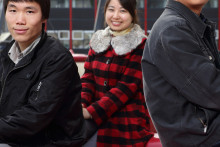Liang: ‘Today is the last day of my first year in the Netherlands.’ Wenlong: ‘I received my annual review this morning.’ Junwen: ‘I received it yesterday!’ What could be a better moment to evaluate the first year as PhD candidates in Twente?
Without the programme, these three talents could not have started their PhDs. Liang, for example, had already established contacts with his supervisor in molecular nanofabrication, but there was no funding available. Similary, Wenlong was advised by Zheijang University to contact Twente’s department of Water Engineering and Management, but there were no means for follow up. The Talent & Training China – Netherlands programme was the solution.
This collaboration between the Chinese Scholarship Council and the Dutch Organisation for Scientific Research serves several purposes: it recruits highly talented PhD candidates into the Netherlands, it increases China’s knowledge and it strengthens scientific cooperation between the two countries. Wenlong explains the procedure: ‘First, we had to be selected for the programme itself. Then we had to find a research group that would have us and only then could we apply for the actual scholarship.’
I choose you, you choose me
Interestingly, three out of the twelve PhDs who started the programme in 2011 chose the University of Twente. Why is that? Junwen: ‘The supervisors show real interest in the proposals, it feels like a two-way street. ’ ‘It is a good fit because we chose them and they chose us’, Liang adds.
The role of Twente Graduate School deserves special attention: one of the eligibility requirements for the programme is there must be a graduate school at the university so without TGS, the UT could not have participated in the programmme. Junwen: ‘In China, grad schools are sometimes mainly administrative. Here, it has an academic link and we benefit from it.’
Sand, policies and nano
The three PhDs couldn’t have been more diverse in their research topics. Wenlong investigates the influence of sand extraction: ‘There is a lot of sand extraction going on in China, for economic or navigation purposes. But there is little attention paid to its consequences. I want to find out how to predict storm behaviour and how to reduce water set-up along the coast, to help policy makers make better decisions.’
Junwen also aims to help policy makers in their decisions, albeit in a different way. She studies how the evaluation mechanism designs of non-university research institutes work for national science and technology policies, to see if they do what they intend. ‘I want to develop practical evaluation mechanisms for research institutes, so that public money will be allocated more economically, effectively and efficiently.’
Last but not least, Liang researches new nano-fabrication techniques: ‘I already studied this topic during my Master’s, but in Twente there is attention to chemistry alongside physics. I had to get used to that.’ Liang’s focus is on nano-scale imprint lithography, which is often used for integrated circuits. He says, ‘I want to push the technology to industry level.’
And the list of researchers continues, as the next generation has already risen: Bojian Xu and Lv Shaoning will join the research force in November.







